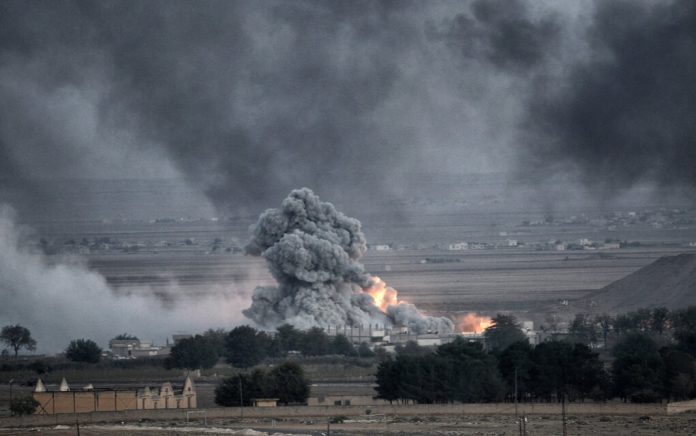
A recent wave of U.S. airstrikes in Yemen has ignited a fierce backlash from Houthi rebels, amplifying tensions in the already turbulent region.
Key Takeaways
- The Houthis retaliated against U.S. airstrikes by targeting Navy ships, although their attacks failed to inflict damage.
- Key U.S. officials, including Trump, have justified the airstrikes as crucial for maritime security.
- Iran’s involvement, whether in support or denial of Houthi actions, complicates the geopolitical landscape.
- There are high civilian casualties attributed to the airstrikes, intensifying anti-American sentiments.
Backdrop of Conflict
President Donald Trump directed U.S. airstrikes in Yemen against Iranian-backed Houthi rebels to protect crucial shipping lanes. In response, the Houthis launched an unsuccessful missile and drone attack on the U.S. Navy ships in the Red Sea. Despite claims of firing 18 ballistic missiles, American defenses thwarted the assault.
The U.S. military action, lauded by Trump as “decisive and powerful military action”, aimed at crippling Houthi provocations, particularly their threats to disrupt global maritime trade in the Red Sea. The Houthis perceived these strikes as “war crimes,” and vowed retaliation with poignant imagery of American coffins, which underscores the severity of their messaging.
🚨🇾🇪 HOUTHIS THREATEN RETALIATION AFTER U.S. STRIKES IN YEMEN
At least 24 people were killed in U.S. airstrikes on Yemen, including 13 in Sanaa and 11 in Saada, according to Houthi-run media.
The strikes targeted military and strategic sites following continued Houthi attacks… https://t.co/NEFRPZijCO pic.twitter.com/eINJYFjdc5
— Mario Nawfal (@MarioNawfal) March 16, 2025
Geopolitical Ramifications
As the U.S. intensifies attacks in Yemen, Iran remains a pivotal player. Accusations swirl regarding Iran’s backing of the Houthi rebellion, though official Tehran denies involvement. National security adviser Mike Waltz warned of “an overwhelming response,” targeting Houthi leaders and holding Iran accountable, adding layers to the geopolitical entanglement.
Iran’s Revolutionary Guards threatened decisive retaliation should U.S. pressures persist. Meanwhile, the U.N. has called for restraint to prevent further instability in Yemen, urging a cease-fire in military activities to avert destitution.
Commentary by @BashaReport
Tonight's U.S. airstrikes have dramatically shifted the dynamic by targeting key Houthi strongholds. The initial airstrike focused on the Jeraf neighborhood in northern Sanaa, near the airport—an area known for its concentration of senior Houthi… pic.twitter.com/vmekkHNzVB
— Basha باشا (@BashaReport) March 15, 2025
Impact on Civilians
The human cost of the conflict is significant. The Yemeni Health Ministry reported 53 deaths and 98 injuries resulting from U.S. strikes, clipping the notion of surgical precision. Some analysts suggest that these heavy civilian tolls could bolster the Houthi resolve with intensified anti-American sentiment.
“To all Houthi terrorists, YOUR TIME IS UP, AND YOUR ATTACKS MUST STOP, STARTING TODAY. IF THEY DON’T, HELL WILL RAIN DOWN UPON YOU LIKE NOTHING YOU HAVE EVER SEEN BEFORE!” reads a post on Truth Social by Trump.
Concerns remain over the protracted conflict, leaving the path forward uncertain as experts assess potential escalation. Critics, including former diplomat Nabeel Khoury, have urged diplomatic solutions, warning that military aggression may only infuse more violence.





